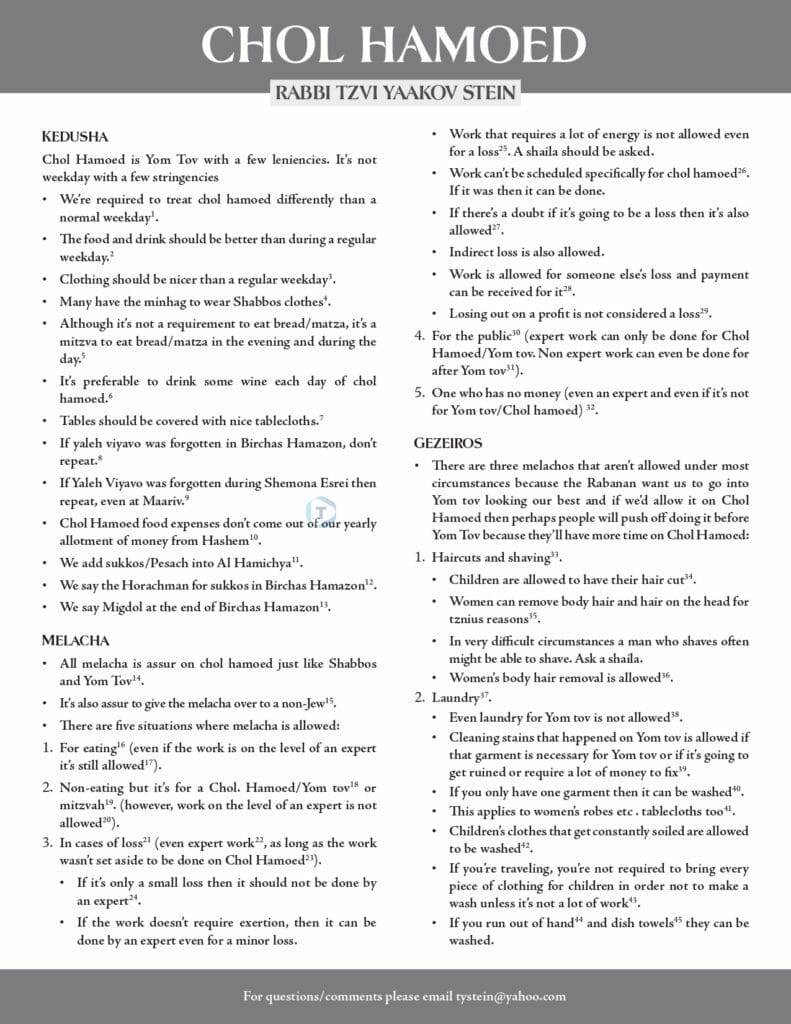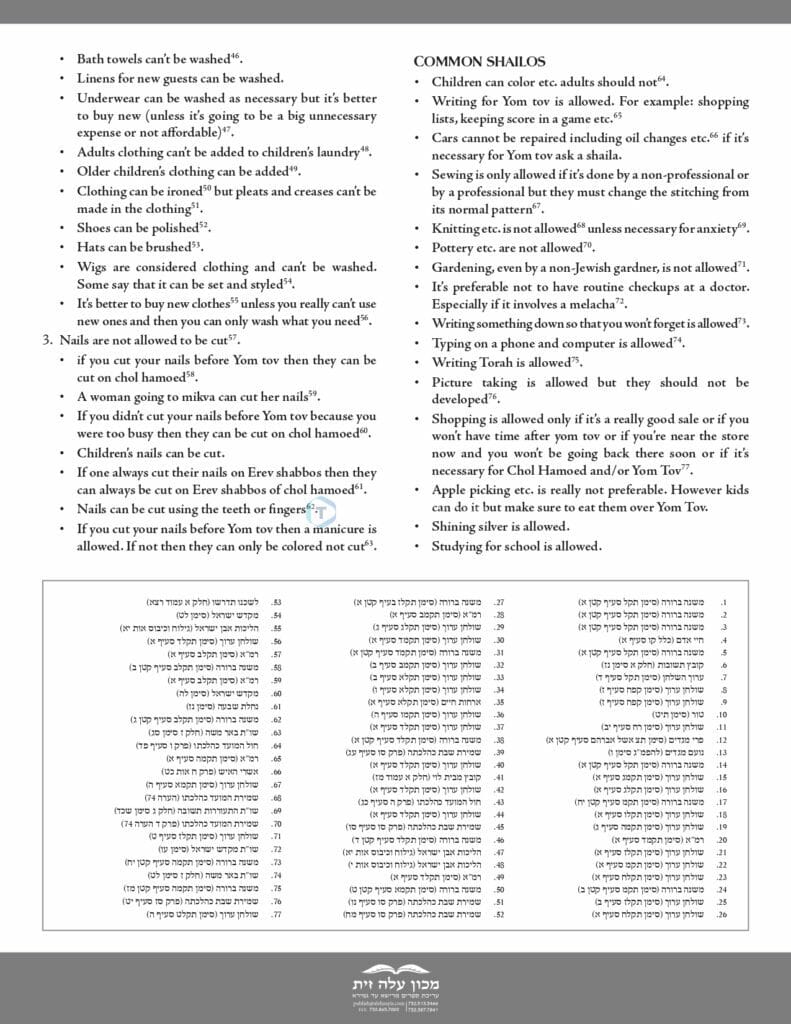Kedusha
Chol Hamoed is Yom Tov with a few leniencies. It’s not a weekday with a few stringencies.
• We’re required to treat chol hamoed differently than a normal weekday.
• The food and drink should be better than during a regular weekday.
• Clothing should be nicer than a regular weekday.
• Many have the minhag to wear Shabbos clothes.
• Although it’s not a requirement to eat bread/matza, it’s a mitzva to eat bread/matza in the evening and during the day.
• It’s preferable to drink some wine each day of chol hamoed.
• Tables should be covered with nice tablecloths.
• If yaleh viyavo was forgotten in Birchas Hamazon, don’t repeat.
• If Yaleh Viyavo was forgotten during Shemona Esrei, then repeat, even at Maariv.
• We add sukkos/Pesach into Al Hamichya.
• Chol Hamoed food expenses don’t come out of our yearly allotment of money from Hashem.
• We say the Horachman for sukkos in Birchas Hamazon.
• We say Migdol at the end of Birchas Hamazon.Melacha
Melacha
• All melacha is assur on chol hamoed just like Shabbos and Yom Tov.
• It’s also assur to give the melacha over to a non-Jew.
• There are five situations where melacha is allowed:
1. For eating (even if the work is on the level of an expert, it’s still allowed).
2. Non-eating but it’s for a Chol Hamoed/Yom Tov or mitzvah. (However, work on the level of an expert is not allowed).
3. In cases of loss (even expert work, as long as the work wasn’t set aside to be done on Chol Hamoed).
• If it’s only a small loss, then it should not be done by an expert. • If the work doesn’t require exertion, then it can be done by an expert even for a minor loss.
• Work that requires a lot of energy is not allowed even for a loss. A shaila should be asked.
• Work can’t be scheduled specifically for chol hamoed. If it was, then it can be done.
• If there’s a doubt if it’s going to be a loss, then it’s also allowed.
• Indirect loss is also allowed.
• Work is allowed for someone else’s loss and payment can be received for it.
• Losing out on a profit is not considered a loss.
4. For the public (expert work can only be done for Chol Hamoed/Yom Tov. Non-expert work can even be done for after Yom Tov).
5. One who has no money (even an expert and even if it’s not for Yom Tov/Chol Hamoed).
Gezeiros
There are three melachos that aren’t allowed under most circumstances because the Rabanan want us to go into Yom Tov looking our best and if we’d allow it on Chol Hamoed, then perhaps people will push off doing it before Yom Tov because they’ll have more time on Chol Hamoed:
1. Haircuts and shaving
• Children are allowed to have their hair cut.
• Women can remove body hair and hair on the head for tznius reasons.
• In very difficult circumstances, a man who shaves often might be able to shave. Ask a shaila.
• Women’s body hair removal is allowed.
2. Laundry
• Even laundry for Yom Tov is not allowed.
• Cleaning stains that happened on Yom Tov is allowed if that garment is necessary for Yom Tov or if it’s going to get ruined or require a lot of money to fix.
• If you only have one garment, then it can be washed.
• This applies to women’s robes, tablecloths too.
• Children’s clothes that get constantly soiled are allowed to be washed.
• If you’re traveling, you’re not required to bring every piece of clothing for children in order not to make a wash unless it’s not a lot of work.
• If you run out of hand towels and dish towels, they can be washed.
• Bath towels can’t be washed.
• Linens for new guests can be washed.
• Underwear can be washed as necessary, but it’s better to buy new (unless it’s going to be a big unnecessary expense or not affordable).
• Adults’ clothing can’t be added to children’s laundry.
• Older children’s clothing can be added.
• Clothing can be ironed, but pleats and creases can’t be made in the clothing.
• Shoes can be polished.
• Hats can be brushed.
• Wigs are considered clothing and can’t be washed. Some say that it can be set and styled.
• It’s better to buy new clothes unless you really can’t use new ones, and then you can only wash what you need.
3. Nails are not allowed to be cut.
• If you cut your nails before Yom Tov, then they can be cut on Chol Hamoed.
• A woman going to mikva can cut her nails.
• If you didn’t cut your nails before Yom Tov because you were too busy, then they can be cut on Chol Hamoed.
• Children’s nails can be cut.
• If one always cuts their nails on Erev Shabbos, then they can always be cut on Erev Shabbos of Chol Hamoed.
• Nails can be cut using the teeth or fingers.
• If you cut your nails before Yom Tov, then a manicure is allowed. If not, then they can only be colored, not cut.
Common Shailos
• Children can color, etc. Adults should not.
• Writing for Yom Tov is allowed. For example, shopping lists, keeping score in a game, etc.
• Cars cannot be repaired, including oil changes. If it’s necessary for Yom Tov, ask a shaila.
• Sewing is only allowed if it’s done by a non-professional or by a professional, but they must change the stitching from its normal pattern.
• Knitting, etc. is not allowed unless necessary for anxiety.
• Pottery, etc. is not allowed.
• Gardening, even by a non-Jewish gardener, is not allowed.
• It’s preferable not to have routine checkups at a doctor, especially if it involves a melacha.
• Writing something down so that you won’t forget is allowed.
• Typing on a phone and computer is allowed.
• Writing Torah is allowed.
• Picture taking is allowed, but they should not be developed.
• Shopping is allowed only if it’s a really good sale, or if you won’t have time after Yom Tov, or if you’re near the store now and won’t be going back there soon, or if it’s necessary for Chol Hamoed and/or Yom Tov.
• Apple picking, etc. is really not preferable. However, kids can do it but make sure to eat them over Yom Tov.
• Shining silver is allowed.
• Studying for school is allowed.
For questions/comments please email [email protected]
Download and Share:












